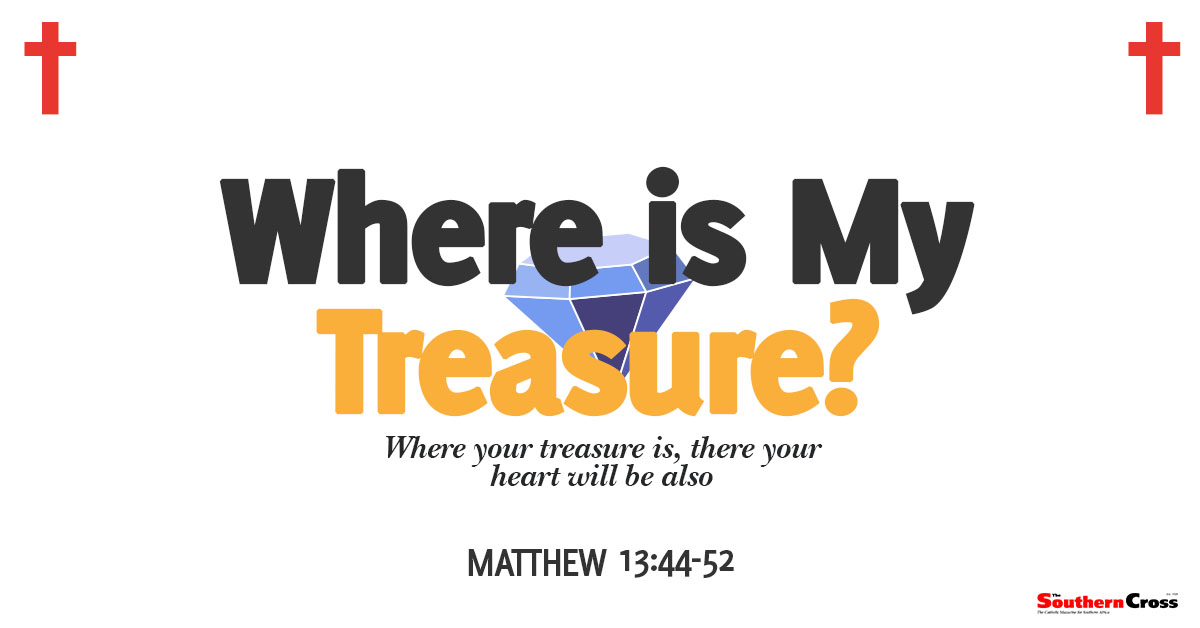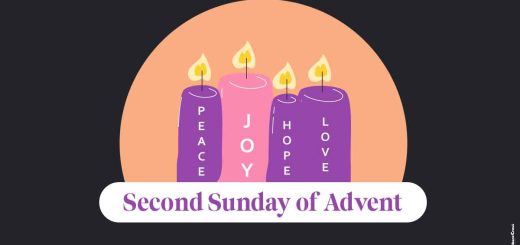Where is My Treasure? 17th Sunday in Ordinary Time

Sermon by Emmanuel Suntheni OSB – Seventeenth Sunday In Ordinary Time – Year A
Sermon And Christian Act In The Word
Theme: “Where is my treasure? God’s values must be our treasure!
Point of Reflection: What do I cherish most in my life? Does it lead me closer to God or away from him? How does my life focus affect my relationship with others? Does it lead me closer to them or away from them? As Christians, we are invited to make the Gospel values come alive in our life through a reflective reading of the Word of God.
First Reading: 1 Kgs 3:5. 7-12
Psalm: Psalm Ps 119:57. 72. 76-77. 127-128. 129-130 (97a)
Second Reading: Rom 8:28-30
Gospel: Matthew 13:44-52
Sermon (Reflection): As a Benedictine myself, what comes first to mind when I read the scriptural readings of today, is contentment and love. As Christians, we need to be contented with what we have and love, that must be our treasure.
In the context of today’s readings, treasures are those values and acts that make a person a member of God’s Kingdom. For Solomon, wisdom and discernment were the most valuable “treasure” he desired in order to be a good king. Paul saw the love for God and conformity to Christ as the greatest values. These values allow a Christian to be certain of possessing the greatest treasure ever – eternal salvation. Jesus taught that what makes a person partake in God’s kingdom is of the greatest value and the treasure to search for, because, as he stated, “where your treasure is, there your heart will be also” (Matt 6:21). Indeed, the search for the greatest treasure might be summarised in the words of the Psalmist: “Truly I love your commandments more than gold, more than fine gold. Truly I direct my steps by all your precepts”.
The first reading of today reports a decisive moment at the beginning of Solomon’s reign. He had just been appointed the king, replacing his ageing father, David. Solomon knew that he was young and inexperienced, and needed God’s help to rule the kingdom effectively. To secure this help he did two things. First, he went to a place called Gibeon and offered a burnt offering to God, thus confirming his decision to follow in the footsteps of his father David through a wholehearted devotion to the Lord (cf. 1 Kgs 3:3-4). Next, when God responding to this act of reverence appeared to him “in a dream by night”, Solomon asked for “an understanding mind to govern your people, able to discern between good and evil”. He asked for a wise and discerning mind so that he would be able to complete his mission of leading God’s people well. God was pleased with this unselfish request, which reflected the young king’s concern for the people and the kingdom, rather than for his own glory. Not only did God grant his request for wisdom, but also promised him other benefits which he had not explicitly requested (1 Kgs 3:13). Solomon’s choice represents a very accurate identification of the true values in life. Requesting skills and abilities he needed to live a life pleasing to God and beneficial to others, he showed that he valued God and others most.
On the basis of the knowledge, as recounted in the second reading of today, Paul declares that “all things work together for good”, for those who love God. This means that both the sufferings he mentioned earlier in the chapter and positive life experiences ultimately lead to the same end, thus, final salvation. He makes this claim because of his unshakable conviction that those who became Christians were called by God to this life because God loved them. If God loved them, then nothing could possibly deprive them of the final victory of God’s love, thus, their salvation. Not surprisingly Paul concludes this section with the memorable words, “For I am convinced that … [nothing] in all creation, will be able to separate us from the love of God in Christ Jesus our Lord” (Cf. Romans 8:38-39).
Love is the crucial theme in today’s second reading. It relates to the “foreknowledge” Paul mentions. According to the Jewish understanding, to say that “God foreknew” those who loved him means that he loved them first. Since he loved them, he also “predestined them”. This difficult term means that God, from the beginning of time, set the believers apart for a special purpose – salvation. Paul decrees that God called believers to faith from the beginning of time, with the definitive purpose of leading them to the union with himself in eternity.
How are Christians to respond to this astonishing gift? In today’s passage, Paul implies that the response needed is to love God back. He defines Christians as “those who love God” and are “conformed to the image of his [God’s] Son”. Being conformed to Christ means essentially believing in him and shaping one’s life according to his example and his teaching. According to Paul’s words, true values that make human life worth living are found in loving God and conforming oneself to Jesus. These values are “true” because they lead to eternal life in God’s presence.
The Gospel passage of today concludes the third major discourse of Jesus in the Gospel of Matthew called the “Sermon on the Kingdom of Heaven”, delivered almost entirely in parables. The three parables in today’s reading are the shortest in this sermon. The first two – “treasure hidden in a field” and “a merchant in search of fine pearls” – demonstrate the surpassing value of God’s Kingdom, while the third one – “a net thrown into the sea” – adds an eschatological application to this message. The Kingdom of Heaven, in the Matthean view, is all about the search for God while living in the present world. Since Jesus is the one who brought this Kingdom to earth, it means that adherence to Jesus and his teaching becomes the sure way to find God and place oneself under God’s rule. Such focus should dominate human life, much like the hidden treasure and the precious pearl dominated the life of the farmer and the merchant in the parables.
Moreover, such a focus makes a person righteous in this life, with lasting consequences at the end of times, when there will be a separation between those who truly belonged to the Kingdom (the righteous) and those who did not take the Kingdom seriously (the evil ones). Jesus ended his teaching on this subject with the question, “have you understood all this?” The disciples give an affirmative answer, showing that they understand that the true and most important value for life is that which makes a person a member of God’s kingdom.
Jesus closed the entire speech in parables with a cryptic reference to “the scribe who has been trained for the kingdom of heaven” who brings out of his treasure things both “new” and “old”. In the Matthean Gospel, this phrase refers to the valuable and important teachings of both the Old Testament Scripture, and Jesus’ own teaching which the disciples are to rely on while living out their discipleship. Thus, the ultimate treasure for those who chose to adhere to God is his word contained in the Old Testament and the message of Jesus which would be eventually committed to the pages of the New Testament.
Christian Act in Word of God “The treasure”
As we move through life carrying out our daily activities, we have a lot of things that concern us. Among the many things that we possess, there is usually one that we hold close to our heart or cherish the most. Today, some adore electronic gadgets such as smartphones, iPad, tablets or the latest trendy fashion. These are the kinds of things that we seek to identify ourselves with. A young person will do whatever it takes to make sure they get the latest gadget or fashion wear, and woe to the person who would destroy or spoil those. Adults tend to pursue other treasures which might have to do with power, career, security or love.
These might be valuable and legitimate pursuits, however, the question posed by today’s liturgy remains, “What is my greatest value, my most precious treasure”? We give thanks to God for all the good things of this life. However, none of them should own us, we should own them, and through them remember God, the greatest treasure that our hearts should always look for. Let us seek him first before created things.
Paul tells us that we should have absolute trust and confidence in God, who created us, and by his love has called us to be Christians. Knowing this he declared that, “all things work together for good, for those who love God”. Jesus in the Gospel reminds us that, as partakers in the kingdom, we ought to search for the greatest value, which is the kingdom, by authentically living out the values of the Gospel in our own concrete situations. There is a Nigerian proverb which says that “a person does not wander far away from where his meat is roasting.” In the Gospel Jesus states, “Where your treasure is there will your heart be also”. Thus, our one and main treasure should be the desire for the kingdom of God in all that we do. The greatest value, which is the kingdom of God, should be very close to our hearts. We should never wander far from it, but always remember to come back to it whenever we go astray.
Action:I will commit myself to try to put into practice one specific Gospel value by being compassionate to others.
Prayer: God our Father, we thank you for the gift of your word to us today. You loved us first and called us to be imitators of your Son Jesus, as we ask ourselves where is our treasure, enter into our hearts and help us to be content with what we have and that God’s values must be our treasure always, we ask this through Christ our Lord, Amen.
- A Call to Repentance: 2nd Sunday of Advent - December 5, 2025
- Prepare to Receive the Lord: 1st Sunday of Advent - November 28, 2025
- The Healer of Brokenness: Christ the King - November 21, 2025





